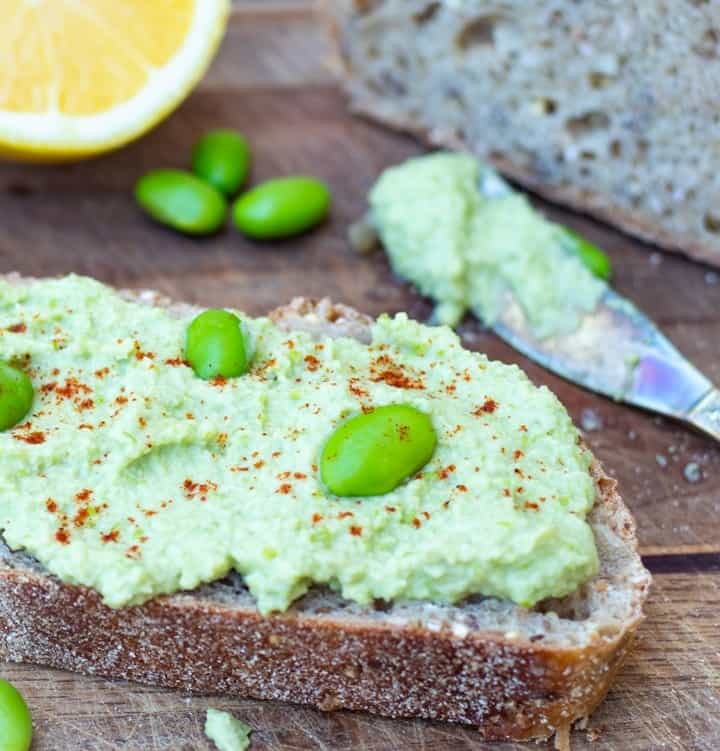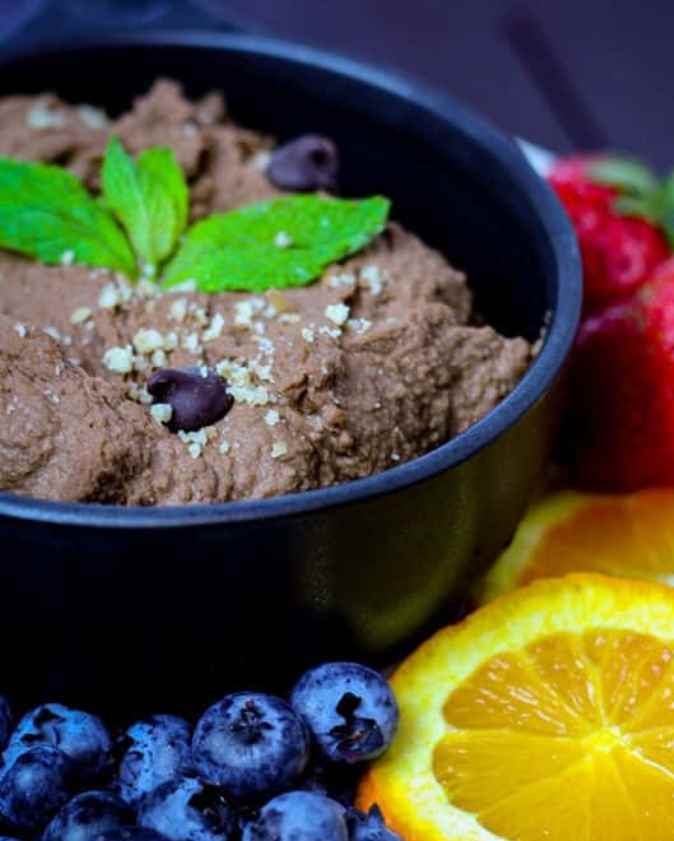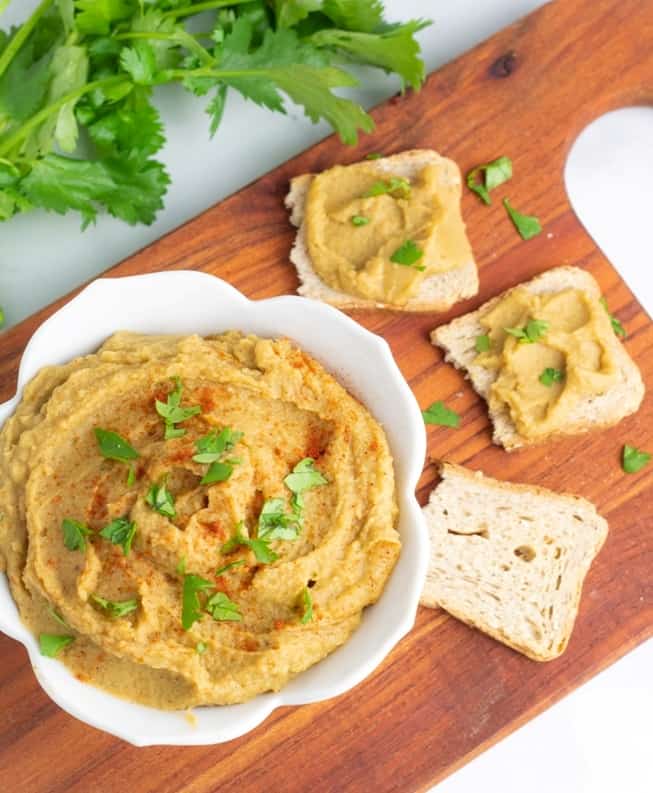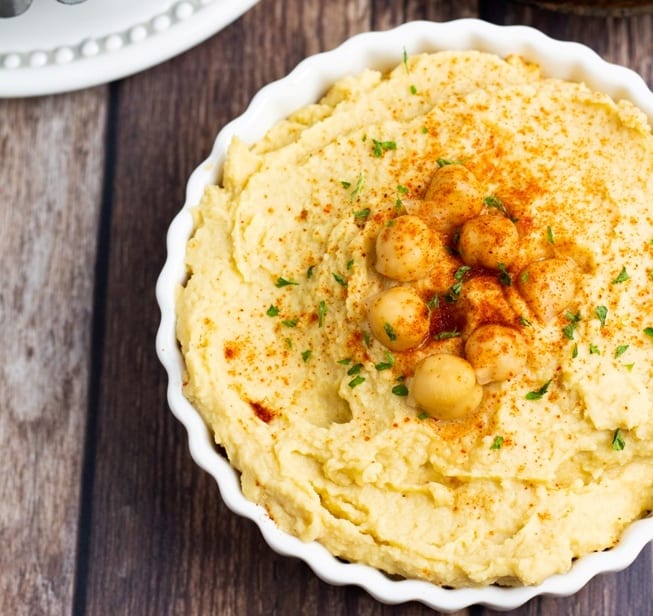Is Hummus Healthy?
Hummus is a hugely popular chickpea-based spread that is terrific used as a dip with veggies and crackers or as a spread for sandwiches and wraps. But, is it really healthy?
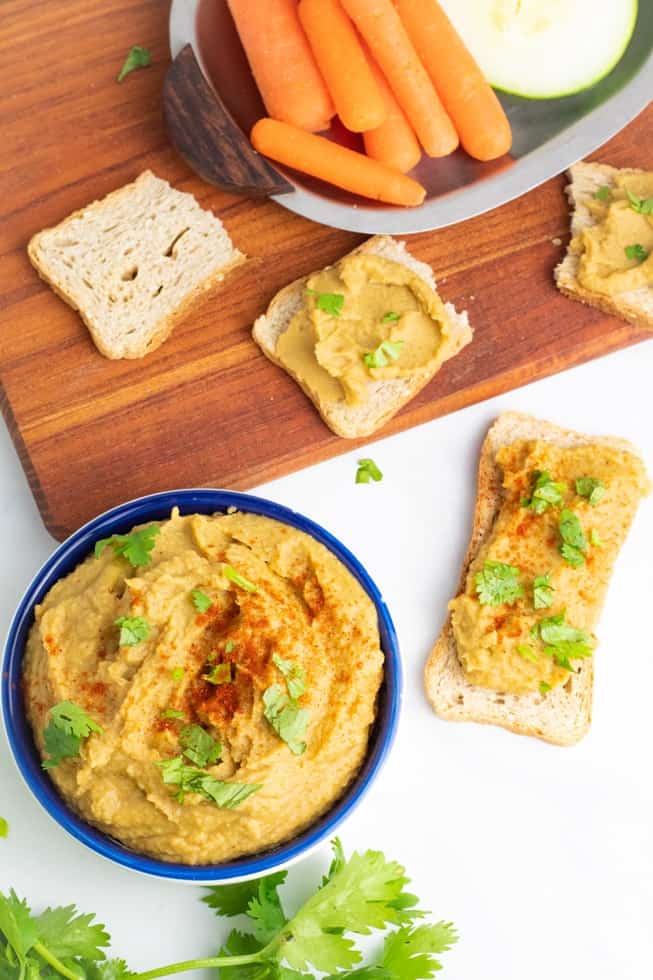
So what is hummus?
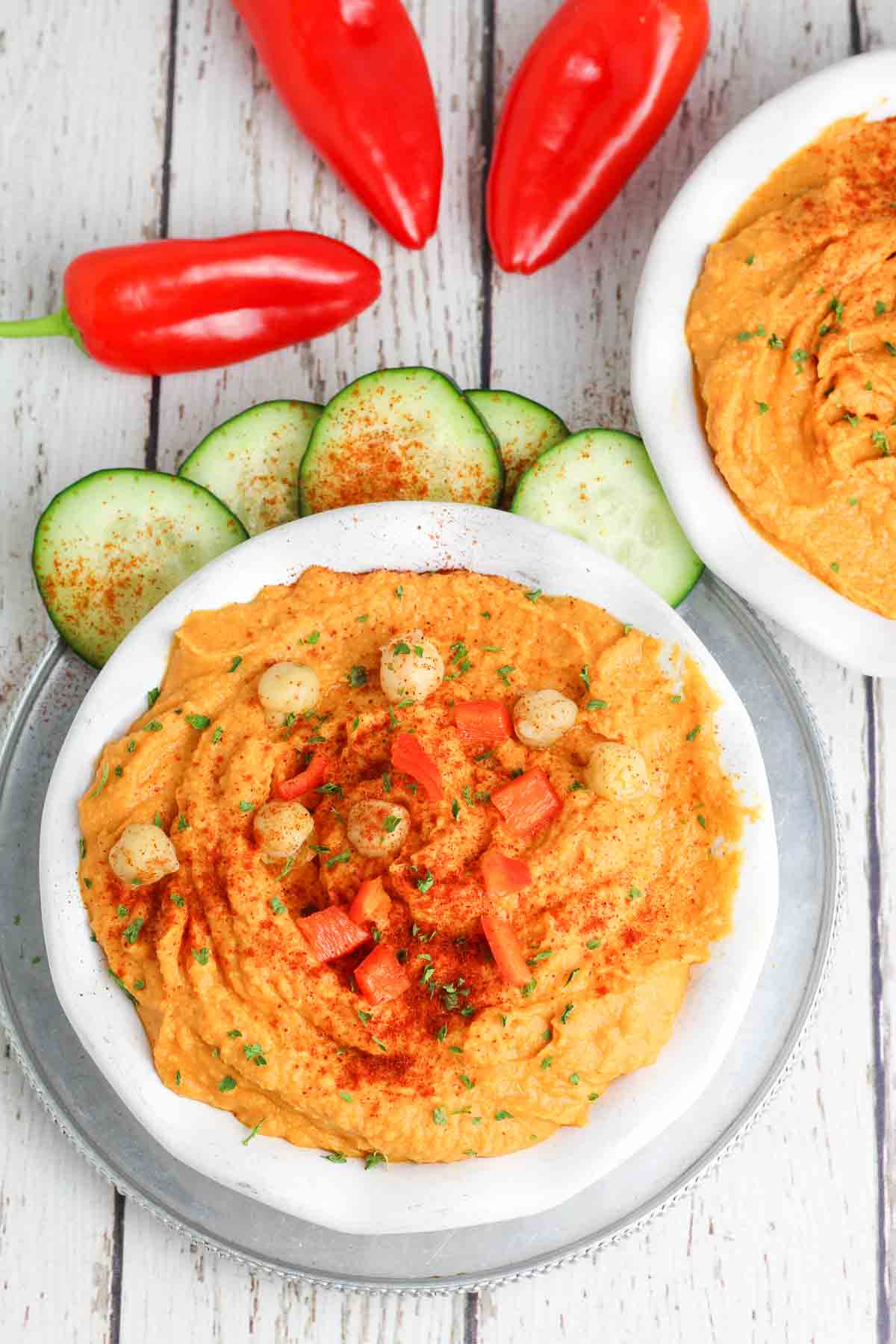
Hummus is a creamy (or chunky) thick spread made primarily from mashed chickpeas (aka garbanzo beans) and a few other healthy ingredients.
It originated in the Middle East and now is a very popular snack all over the world. Almost all varieties are completely vegan and used for everything from dips to sandwich spreads.
What is hummus made of?
There are so many different varieties of this delicious spread, and most often it is made with a base of chickpeas (or garbanzo beans) and a handful of other ingredients that are just blended together in a food processor or blender. Hummus base ingredients include:

- Chickpeas (garbanzo beans or edamame)
- Garlic cloves
- Tahini (crushed sesame seeds)
- Vegetable broth
- Lemon juice
- Salt
The recipe card at the bottom of the page has the full list of ingredients with measurements and instructions.
Is hummus good for you?
Hummus has some impressive nutritional benefits. One cup has:
- 15 grams of protein
- 4-5 grams of fat
- 45 grams of complex carbohydrates
- 6 grams of fiber
- meets 70% of the daily value for folate
- meets 26% of DV for iron
- manganese, magnesium, zinc, and copper
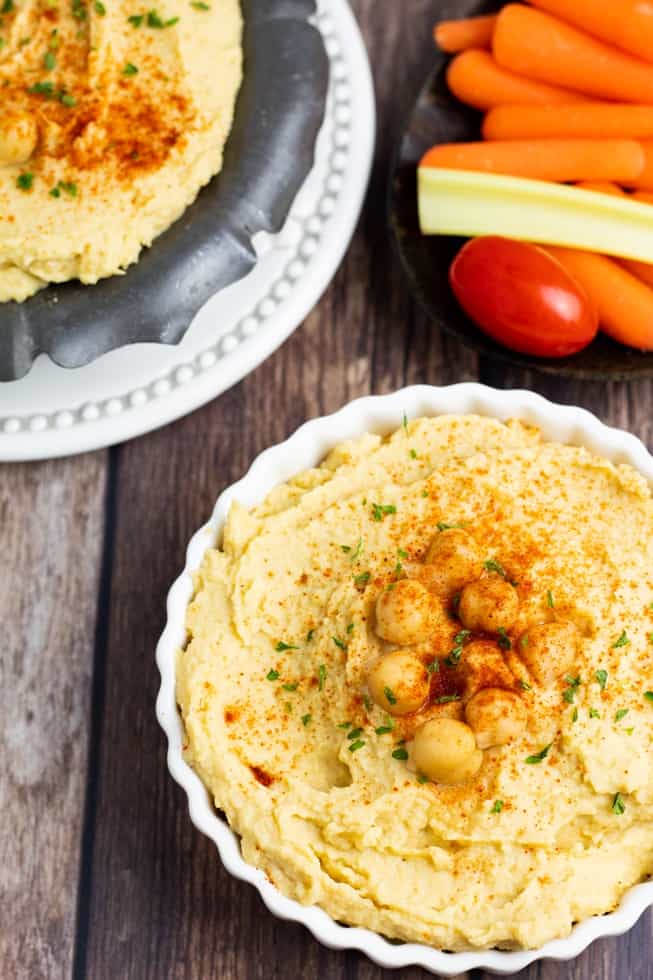
Can hummus be made unhealthy?
Unfortunately, most store-bought hummuses are made with a lot of oil, and many homemade recipes call for adding oil as an ingredient.
There are a number of reasons to steer clear of adding oil to hummus including:
- Only 1 Tbsp of oil has 119 calories. I would have to power walk or jog 1.5 miles to burn that small amount off.
- Gram-for-gram oil has the same amount of fat as beef fat, and 13% of that fat is artery-clogging saturated fat.
- All oil (even plant oils) causes insulin resistance which leads to diabetes.
- We know from research that within hours of ingesting oil, our arteries begin to stiffen and their ability to dilate is impaired
Healthy hummus for snacks
We have healthy no-oil vegan hummus in our refrigerator most of the time to use as a dip and sandwich/veggie wrap spread.
Even when we go on road trips, we carry a small lunchbox cooler with this stuff.
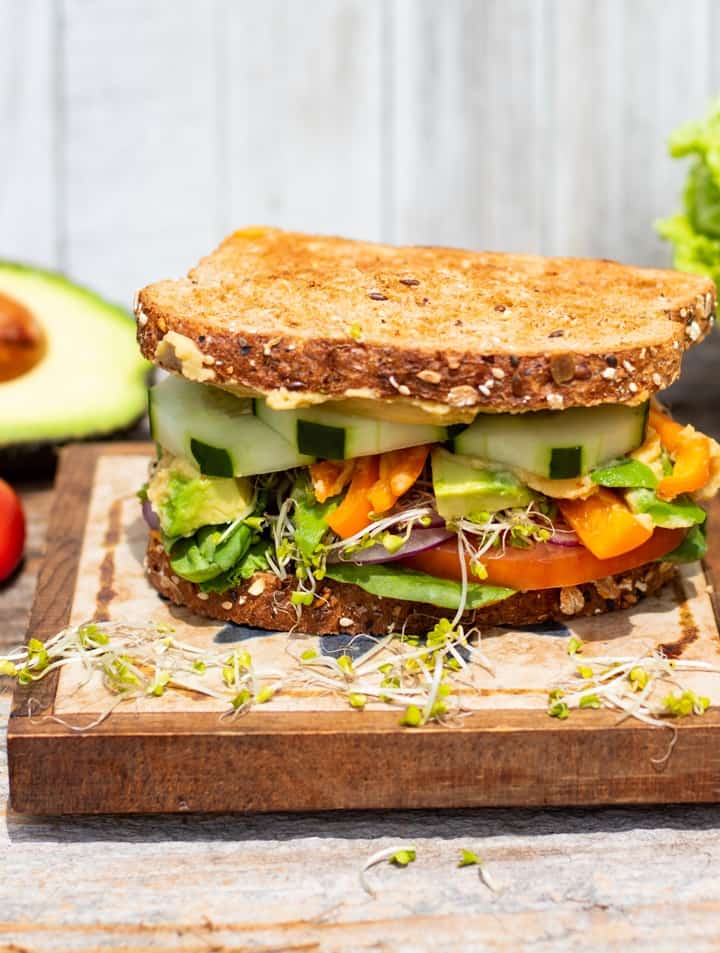
Can you freeze hummus?
Healthy homemade hummus lasts approximately 7-10 days in a tightly sealed container in the refrigerator.
Hummus even freezes well in an airtight container for up to 6-8 months. The day before you want to eat it, move the hummus container from the freezer to the refrigerator. It takes at least a few hours to thaw until it’s ready to eat. Thawing can take longer depending on how much is in your container.
It’s best to freeze hummus in small portions to make defrosting quicker and to have handy small amounts to eat in one sitting.
Frequently Asked Questions
Hummus can be helpful for weight loss when enjoyed in moderation. Its high fiber and protein content can keep you feeling full, but be mindful of portion sizes and pair it with healthy dippers like veggies.
Store-bought hummus is generally healthy, but homemade versions allow you to control ingredients and avoid added oils, preservatives, or excess salt. Opt for brands with simple, clean ingredients if buying pre-made.
Hummus is a good source of plant-based protein, but it’s not considered high in protein compared to foods like lentils or tofu. A 2-tablespoon serving of hummus typically contains about 2–3 grams of protein. While it’s not a protein powerhouse, it can still contribute to your daily protein intake, especially when paired with other protein-rich foods like whole-grain pita or vegetables like broccoli and snap peas.
Delicious Oil-Free Hummus Recipes
Want to Save This Recipe?
Enter your email & I’ll send it to your inbox. Plus, get great new recipes from me every week!
By submitting this form, you consent to receive emails from EatPlant-Based

How to Make Hummus
Ingredients
- 2 cloves garlic
- 2 tablespoons lemon juice
- 1-1/2 cups cooked chickpeas. This is same as 1 15 oz can beans, drained and rinsed thoroughly
- 3 tablespoons veggie broth or water more if needed to blend
- 1 tablespoons Tahini OPTIONAL
- 1 teaspoon sea salt
Instructions
- Begin by draining all liquid from the chickpeas whether they are freshly cooked in an Instantpot or from a can.
- Add all of the ingredients to a blender or food processor and process for 1-2 minutes. Blend well to allow the chickpeas to become smooth.
- If you don’t have a high powered blender, you’ll need to stop and scrape down sides and stir a few times in between processing. One thing I love about having a Vitamix blender is that it has a tamper to push ingredients down to the blades, so stopping is not necessary.
- I personally like my hummus left just a little chunky, but many people like theirs completely smooth. Process until reaching your preferred consistency.
- This hummus is delicious on carrot and celery sticks, sandwiches and wraps, baked potatoes, veggie/grain bowls, and even on toast.
Video
Notes
- Q: Do I have to use fresh lemon juice? No, bottled lemon juice works fine in this recipe. I’ve even used lime juice with great success.
- Q: Can I use canned chickpeas to make this? Absolutely! This recipe calls for 1.5 cups of cooked chickpeas which happens to be the amount in a standard can of chickpeas.
- Q: Can I freeze hummus? Yes, you can freeze hummus for up to 6-8 months in an airtight freezer-safe container.
Nutrition
Disclaimer
To obtain the most accurate representation of the nutritional information in a given recipe, you should calculate the nutritional information with the actual ingredients used in your recipe, using your preferred nutrition calculator. You are solely responsible for ensuring that any nutritional information provided is accurate, complete, and useful.
About Terri Edwards
Hi guys! I am the content creator behind EatPlant-Based and a licensed Food for Life instructor with the Physicians Committee for Responsible Medicine. I am passionate about sharing healthy recipes and tips to empower others to get healthy. I’m so glad you’re here! Read More…

